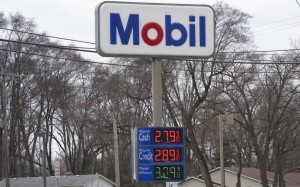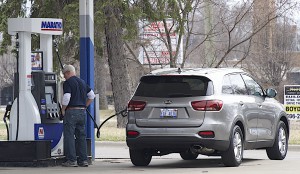For decades going all the way back 1970s, the U.S. economy has been haunted the threat of a spike in oil prices. But it’s teetering on the verge of a plunge in oil prices that threatens both the energy sector and simultaneously the automotive sector, which is putting more and more electric vehicles into play in the face of declining gasoline prices.
The national gas price average is cheaper on the week by 5 cents, and 9 cents cheaper at the pump than it was a year ago giving the vast majority of motorists savings at the pump. At $2.38, the national gas price average has not been this cheap since February 2019.
“For the third week, U.S. gasoline stocks decreased while demand increased. Generally, growing demand amid declining stocks causes increases at the pump, but crude oil prices have dipped to four-year lows, signaling spring could be cheaper at the pump,” said Jeanette Casselano, AAA spokesperson.
(Auto industry waiting for impact of coronavirus in U.S.)
When the global markets opened on Sunday evening, West Texas Intermediate crude oil prices dipped below $30 per barrel for the first time since 2016.

The lack of agreement between OPEC and non-OPEC to cut production is helping to drive down gas prices.
The market plunge is in response to a lack of agreement between Organization of the Petroleum Exporting Countries (OPEC) and non-OPEC countries to cut production. The trend of pump prices facing downward pressure is likely to continue through the end of the winter driving season if crude remains cheap, especially amid concerns about the coronavirus.
The threat of a price war in the energy sector, couple with the anxiety about a coronavirus-led recession – sent stocks tumbling from the opening of trading all around the world.
The Dow Jones Industrial Average last Friday closed down 2,001 points, a 7.7 % dive that marked the index’s worst day percentage-wise since October 2008. The Dow also shattered its record for largest loss as measured by points, which was set at 1,191 on Feb. 27.
The S&P 500 closed with a loss of 7.6 %, and the Nasdaq composite ended Monday with a loss of 7.3 %. The New York Stock Exchange halted trading for a time because of the steep declines.
(Global auto sales expected to fall 2.5% this year as coronavirus impact spreads.)
A price war in the energy sector between major oil producers, Saudi Arabia and Russia, while it pushes down gasoline prices offering a boost to consumers everywhere, also undermines the producers of shale oil across the U.S.

New, 350 kW chargers from Electrify America are being used more and more as automakers continue to roll out new electric vehicles.
Shale have made the U.S. less dependent on imported oil and boosted economic activity, which also could now be at risk if the decline in prices hold for any length of time.
The economic shift is also reflected in the stock market. Shares of Caterpillar plunged the most in 13 years after Morgan Stanley pegged the stock, along with Cummins and United Rentals as among the most exposed in the machinery sector to plunging oil prices, which could lead oil and gas companies to cut spending.
The boom in pick-up trucks sales in the U.S. has coincided with the boom the steady increase in exploration and oil production around the U.S.
The gasoline price drop, however, also comes just as the auto industry is mounting a major effort to encourage consumers to lease electric vehicles. Only last week, General Motor Co. outlined bold plans to introduce several new electric vehicles in the next two years.
(Millennials expectations not met by today’s new vehicles.)
Low gasoline prices have made it more difficult to sell electric cars, automakers have observed for months and on Monday GM announced it was postponing the public introduction of the Cadillac Lyriq in Los Angeles in early April because of concerns about Covid-19.


What I admire are the gas stations near where I live which are steadfastly keeping regular above $3.50 a gallon and premium near $4.00.
Let’s see…… do I want to buy a gasoline car that costs me $5.22 to fill up or spend an additional $5K for an electric that takes 8 hours to charge and gets me 300 miles? Tough decision!
Even at $2/gallon I want to know what gas car costs $5.22 to fill up!
Government should stop giving oil companies subsidies to pave the road for sustainable energy companies. In fact, since that money is already earmarked, why not move it to the sustainable energy sector? We need a bigger push for a breathable planet.